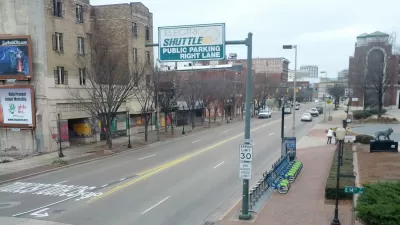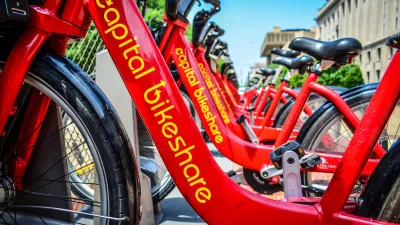Chattanooga didn't let its small population, sprawling environment, and weak cycling culture prevent the city from implementing a small-scale bike-share system. Their experience could hold lessons for other small cities that want jump in the saddle.

After studying the possibility of implementing a bike-share system beginning in 2007, Chattanooga, Tennessee (pop. 170,000) was able to cobble together enough funding and support to launch a 30 station, 300 bike system last July, beating larger cities like New York and Chicago in the process, writes Angie Schmitt. Chattanooga Bike Coordinator Philip Pugliese discussed the city's experiences last week at the New Partners for Smart Growth Conference in Kansas City.
“Our purpose with bike-sharing was to put a large amount of cyclists on the street in a short time, to change the dynamic, to improve our air quality, our health and active transportation overall,” he said.
"It can be difficult to launch bike-share in a small city with a transportation system that is heavily reliant on car travel, Pugliese said. But Chattanooga’s experience can offer inspiration to other small cities."
"In its first six months of operation, the system has provided 12,600 rides. Together, riders burned more than one million calories. All those bike trips have resulted in up to a 8,100-pound reduction in emissions. The system will add three more stations in residential neighborhoods in the spring," adds Schmitt.
"Securing enough capital to keep the system going through the lean start-up years is important, especially in smaller markets, where programs may find themselves on weaker financial footing than in larger cities, Pugliese said. He said the city considers the system an experimental pilot project."
FULL STORY: Chattanooga Bike-Share: Lessons for Smaller Cities

Trump Administration Could Effectively End Housing Voucher Program
Federal officials are eyeing major cuts to the Section 8 program that helps millions of low-income households pay rent.

Planetizen Federal Action Tracker
A weekly monitor of how Trump’s orders and actions are impacting planners and planning in America.

Ken Jennings Launches Transit Web Series
The Jeopardy champ wants you to ride public transit.

Driving Equity and Clean Air: California Invests in Greener School Transportation
California has awarded $500 million to fund 1,000 zero-emission school buses and chargers for educational agencies as part of its effort to reduce pollution, improve student health, and accelerate the transition to clean transportation.

Congress Moves to End Reconnecting Communities and Related Grants
The House Transportation and Infrastructure Committee moved to rescind funding for the Neighborhood Equity and Access program, which funds highway removals, freeway caps, transit projects, pedestrian infrastructure, and more.

From Throughway to Public Space: Taking Back the American Street
How the Covid-19 pandemic taught us new ways to reclaim city streets from cars.
Urban Design for Planners 1: Software Tools
This six-course series explores essential urban design concepts using open source software and equips planners with the tools they need to participate fully in the urban design process.
Planning for Universal Design
Learn the tools for implementing Universal Design in planning regulations.
Heyer Gruel & Associates PA
Ada County Highway District
Institute for Housing and Urban Development Studies (IHS)
City of Grandview
Harvard GSD Executive Education
Toledo-Lucas County Plan Commissions
Salt Lake City
NYU Wagner Graduate School of Public Service



























